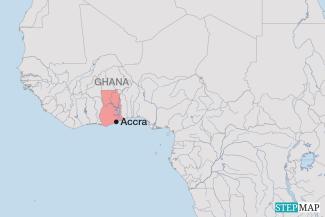Nature preservation
Unknown individuals cut down an ancient tree

Previously, due to its popularity and importance, Okomfo Anokye Bese, a tree in the middle of the main route linking Ghana’s economic city, Kumasi to Lake Bosomtwe, was spared during the highway construction. Tourists and locals believed the cola tree’s black and white seeds could heal diseases and curses.
Per local lore, the tree sprouted where priest Komfo Anokye spat a kola nut in the early 1700s. Its presence served as a testament to the priest’s exploits and the Ashanti Kingdom’s rich history.
The felling of the tree thus took Kyeme Frimpong, a linguist from the Feyiase Traditional Council, by surprise. He expressed his confusion, wondering why someone would choose to do this. “It’s a real shame. This could have significant repercussions for us and the individuals accountable for felling the tree,” he stated with visible anger.
As the incident sparked outrage and calls for greater vigilance in safeguarding the country’s natural treasures, it prompted leaders to reflect on the importance of preserving the environment for future generations. Osei-Bonsu Safo Kantanka, director of research at Manhyia Palace of the Ashanti royal family, recalls that the tree stands at the site where the native peoples of Asantes defeated the Denkira people in 1701, and so it is very important in Ashanti history.
Many Ghanaians expressed their anguish and sadness on social and traditional media when the tree fell, stressing the tree’s relevance to their lives and the need to conserve a rich cultural legacy.
Environmental activists also seized the opportunity to champion the need for responsible land-management practices and the conservation of the country’s natural resources as the activities of illegal miners and unscrupulous people cause grave damage to the environment. Sulemana Issifu, a microbial ecologist and social activist, was quoted by local media saying, “when the ecosystem crosses the tipping point, you are unable to reverse it and even if you want to reverse it, it will take extreme effort.”
He expressed his worries concerning the continuous destruction of Ghana’s sacred lands and water bodies caused by reckless felling of trees and illegal mining activities: “Why do we need to wait to address something that we should be able to stop now.” Over the past two decades, there has been a substantial reduction in forest cover in Ghana.
Dasmani Laary is a Journalist in Ghana.
laarygna@gmail.com











